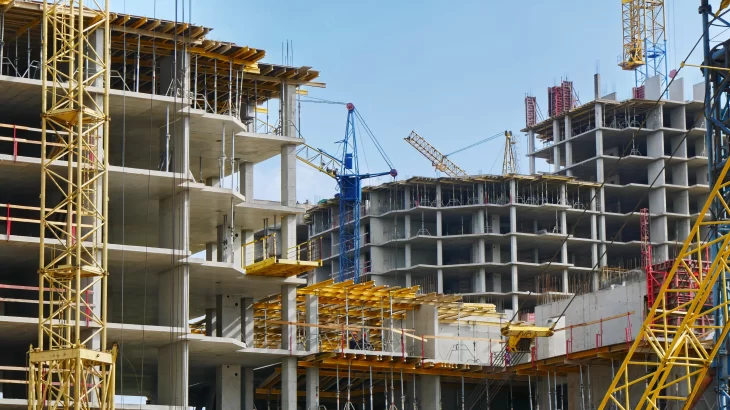The construction industry, when active, has enough potential to absorb unemployment, open up new venues for job seekers in different trades and skills and roll up shutters of affiliated industries and workshops. From ordinary laborers to professional engineers and architects, from the heavy steel industry to iron and carpentry workshops, men and materials are both needed in the construction industry and that’s where money gains its dynamics. In order to build anything –be it a large-scale project like an airport or even a small house –construction contractors would need a relevant chain of suppliers and service providers and this flow of money largely benefits the economy. The construction industry therefore has a strong impact on global economy and encompasses a significant part of the world’s GDP.
During the last three years, the coronavirus pandemic has led to a steep fall in global economic growth. And, economic preservation and strengthening are not as easy as expected. However, according to some experts, a recovery can be observed as some industries like technology, healthcare, retail and construction are playing a vital role in stabilizing the economy. Some, for example, have predicted that by 2030 the construction industry will account for around 15 % of all global economic output. But, the question is: Which countries will become the biggest investors in the construction market?
China
 Historically, China was a country that was held back by poor governance and was often dragged by many wars and battles (both internally and externally), giving no chance for growth and development. However, during the last 70 years, the country has experienced peace, giving them sufficient time to catch up on what they were losing behind. And, as of 2010, the country was said to have surpassed the US in global construction market share.
Historically, China was a country that was held back by poor governance and was often dragged by many wars and battles (both internally and externally), giving no chance for growth and development. However, during the last 70 years, the country has experienced peace, giving them sufficient time to catch up on what they were losing behind. And, as of 2010, the country was said to have surpassed the US in global construction market share.
In 2018, Tesla CEO Elon Musk retweeted a story on his Twitter account about construction in China and commented that “China’s progress in advanced construction/infrastructure is more than 100 times faster than the US.” Later, he tweeted that a part of the reason for the difference in construction efficiency between the US and China lies in US bureaucracy and the fact that private agencies always take a percentage commission.
Indeed in China, the construction industry is strictly dominated by the Chinese government and since the government’s highest interest is to get the right buildings and infrastructure to the people as quickly as possible to meet their needs, China’s construction market can easily outperform other countries.
United States
 Personally, I wonder why the hell construction projects in the US take so long. How can it take 3 months to replace one section of the sidewalk when other countries would get it done in just 3 weeks or even less?
Personally, I wonder why the hell construction projects in the US take so long. How can it take 3 months to replace one section of the sidewalk when other countries would get it done in just 3 weeks or even less?
I agree that construction work is complicated –unless you are building something very basic – and it requires a lot of time. Large, complicated and state-of-the-art construction projects, for example, can take years to complete as they would involve land acquisition, geotechnical engineering, funding, surveying, negotiating contracts and so on. However, during the last decade, America’s construction industry has been heavily criticized.
According to some, “simple home projects in US seem to take forever to be completed.”
However, experts have predicted that by 2030-2035, the US construction industry will bounce back and earn a high ranking in the global construction market.
India
 In India, bureaucracy’s power to obstruct and wreak havoc –in other words, “corruption” – is one of the root causes of why the country’s construction industry took a heavy hit. But, according to many, India is set to become a major contributor to global economic output.
In India, bureaucracy’s power to obstruct and wreak havoc –in other words, “corruption” – is one of the root causes of why the country’s construction industry took a heavy hit. But, according to many, India is set to become a major contributor to global economic output.
“31, 000 houses will be built every day for the next 14 years, to keep up with India’s housing demand.”
– From The B1M



















